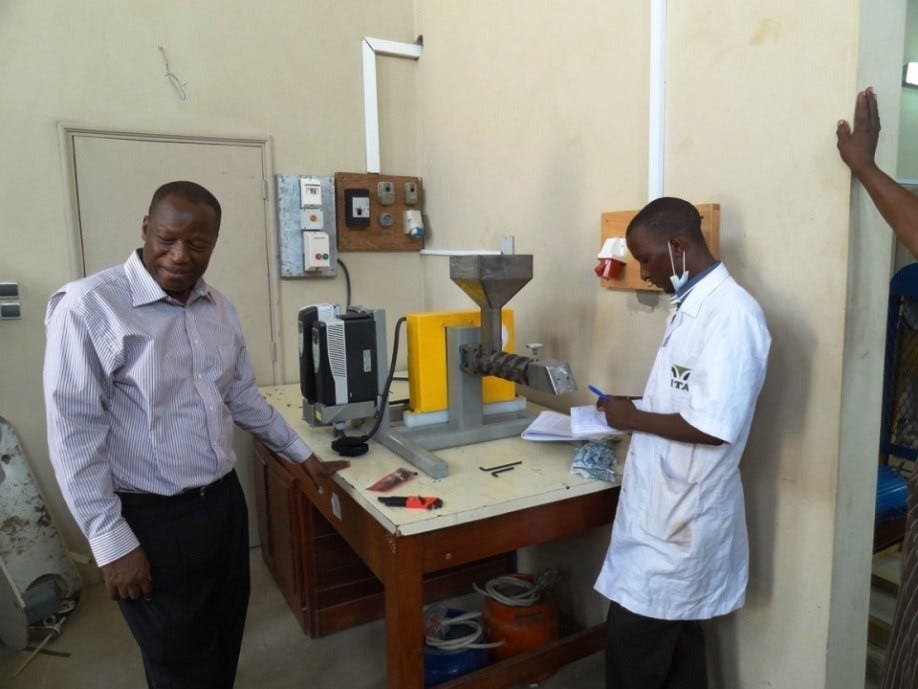Africa is First Stop on Purdue’s Food Mission to Mars
 Ethiopia
Ethiopia
Subscriber Benefit
As a subscriber you can listen to articles at work, in the car, or while you work out. Subscribe NowAlthough Mars and Africa are two distinctly different places, they share some common ground: food scarcity. It’s a problem Purdue University food scientists are addressing both on the red planet and in under-developed African regions with a piece of equipment called an extruder. The machinery forces food through an opening—or die—to mix, cook or shape it into the desired end product, such as pasta or perfectly-puffed Cheetos or Cheerios. Large commercial extruders pump out American junk food, but Purdue scientists are scaling them down to feed astronauts and Africans alike.
The project began when NASA assigned Purdue researchers the task of developing an extruder that astronauts could use on a long-term Mars mission. The extruder would need to be smaller, simpler and cheaper than traditional ones. Using soybeans as a key input, the extruder aims to create food for astronauts, and repurpose the squeezed-out oil for salad dressings and other uses.
“We have a group at Purdue in food science that deals with developing countries,” says Professor of Biochemical and Food Process Engineering Dr. Martin Okos. “They said, ‘A small-scale extruder may work very well in a developing country, where they don’t have large amounts of material. The villages would love to do something like this.’”
The idea launched a second project to develop scaled-down extruders for African countries; Ethiopia, Senegal and Niger will serve as testing grounds for Mars. The devices are being modified to work with regional crops such as wheat, sorghum and rice. The extruder grinds the grain, mixes it with water and forces it through a channel where it’s cooked.
“It’s one-tenth the cost of a comparably-sized commercial extruder that has a lot more complexity to it,” says Okos. “Although it takes some training for people to adapt to it, the extruder can be used at a low cost and with very little fuel inputs.”
Okos says villages, entrepreneurs or small business owners can use the devices to greatly increase their output and also increase the shelf life of various food products. The research team says, using traditional methods, it can take a team of 10 people in Niger an entire day to produce 30 kilograms (about 65 pounds) of couscous; the extruder could increase that number to 300 kilograms (660 pounds).
“Most of the people who would be running the extruder are women,” says Okos. “Instead of spending all of their time making couscous [traditionally] in a pot—and it takes them hours and hours to do it—this could be done very quickly with the extruder. It frees up their time. Entrepreneurs also want this small-size device to process their products and increase their shelf life.”
The team is working with research institutes in urban areas of the African countries. Team members train entrepreneurs in the region to use the extruders and help them secure funding, and those individuals take the machines to the countryside and teach villagers how to use them. Rural areas could also use the method to make products for city-dwellers who desire ready-to-eat or “just add water” traditional foods that are more convenient.
Okos says the research goal is two-fold; one key focus is for developing countries to adopt the device for various uses. For example, a Purdue partnership with the University of Washington School of Medicine used indigenous grains to make ready-to-eat nutritional foods for infants suffering from malnutrition, rather than buying expensive commercial formula. The study showed babies accepted the locally-made mixture equally.
A second focus is to develop mathematical models that will enable the extruder to be scaled-up or scaled-down to any size.
“I was very encouraged we could scale it down by a factor of 10,” says Okos. “Scaling it down further is going to be more difficult.”
Surmounting that challenge is an important stepping stone to space, because NASA needs an even smaller version for a mission to Mars—where a Purdue project could help feed astronauts as they explore the next frontier.
Okos is also working to bring the extruders to India, where they’d be used for a slightly different purpose.
Okos says the scaled-down extruders could also be used by farmers in the U.S.
